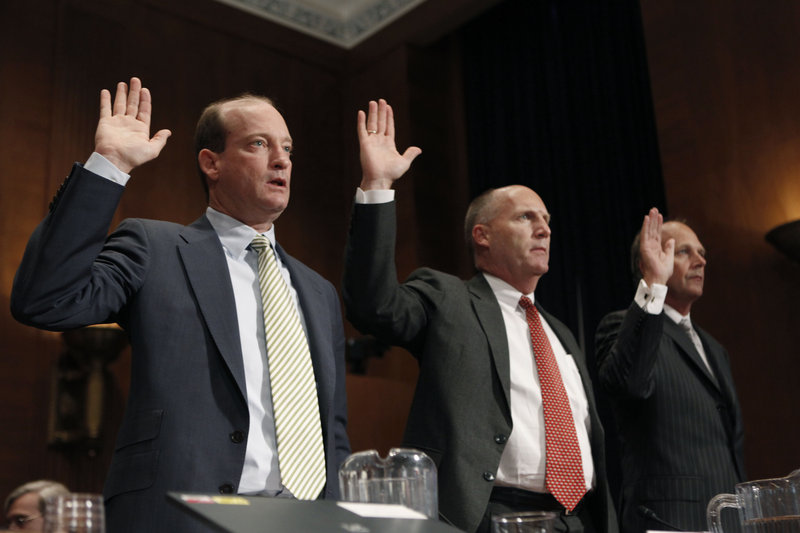WASHINGTON — Congress called BP and its drilling partners to account Tuesday for a “cascade of failures” behind the spreading gulf oil spill, zeroing in on a crucial chain of events at the deep-sea wellhead just before an explosion consumed the rig and set off the catastrophic rupture.
In back-to-back Senate inquiries, executives of the three companies at the heart of the massive spill were chastised by senators over attempts to shift the blame to each other. And they were asked to explain why better preparations had not been made to head off the accident.
“Let me be really clear,” Lamar McKay, chairman of BP America, told the hearing. “Liability, blame, fault – put it over here.” He said: “Our obligation is to deal with the spill, clean it up and make sure the impacts of that spill are compensated, and we’re going to do that.”
By “over here,” McKay meant the witness table at which BP, Transocean and Halliburton executives sat shoulder to shoulder. And despite his acknowledgment of responsibility, each company defended its own operations and raised questions about its partners in the project gone awry.
Lawmakers compared the calamity to some of history’s most notorious disasters from sea to space in the first congressional inquiry into the April 20 explosion and so-far unstoppable spill. In the crowded hearing room, eight young activists sat in quiet protest, wearing black T-shirts saying, “Energy Shouldn’t Cost Lives.” Several wore black painted spots near their eyes to symbolize tear drops made from oil.
Senators sought assurances that BP PLC will pay what could amount to billions of dollars in economic and environmental damages. McKay repeatedly said his company would pay for cleanup costs and all “legitimate” claims for damages, and not try to limit itself to an existing federal limit of $75 million on such damages.
BP was the exploratory well’s owner and overall operator, Transocean the rig’s owner and Halliburton a subcontractor that was encasing the well pipe in cement before plugging it in anticipation of future production.
The explosion is thought to have begun with a surge of methane gas from deep within the well, and while the cause is still under early investigation, the testimony Tuesday provided some insight into what might have been involved.
Republican Sen. Jeff Sessions of Alabama grew frustrated grilling the executives on why engineers replaced a heavy “mud” compound in the well with much lighter sea water – thereby reducing downward pressure on the oil – when they were temporarily capping the site for future exploitation. He quoted an oil rig worker saying, “That’s when the well came at us, basically.”
“I’m not familiar with the individual procedure on that well,” BP’s McKay said.
Steven Newman, Transocean’s president and CEO, and Halliburton executive Tim Probert repeatedly told Sessions they did not know how often sea water instead of the compound was used to seal gulf wells.
“Well, you do this business, do you not?” the senator demanded. “You’re under oath. I’m just asking you a simple question.”
McKay also said that a key piece of safety equipment, the aptly named blowout preventer, had failed to work, and he made it clear it was owned by Transocean. “That was the fail safe in case of an accident,” he said.
But Newman said Transocean’s drilling job was completed three days before the explosion. There’s “no reason to believe” the blowout protector mechanics failed, he said.
Copy the Story Link
Send questions/comments to the editors.



Success. Please wait for the page to reload. If the page does not reload within 5 seconds, please refresh the page.
Enter your email and password to access comments.
Hi, to comment on stories you must . This profile is in addition to your subscription and website login.
Already have a commenting profile? .
Invalid username/password.
Please check your email to confirm and complete your registration.
Only subscribers are eligible to post comments. Please subscribe or login first for digital access. Here’s why.
Use the form below to reset your password. When you've submitted your account email, we will send an email with a reset code.